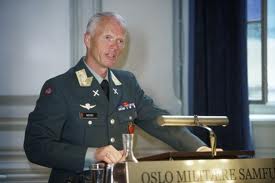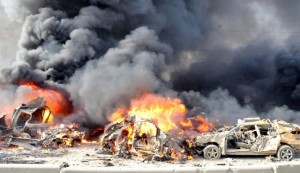 BEIRUT, Lebanon — New fighting was reported in the Syrian capital, Damascus, on Monday, a day after the government denied that it had used heavy weapons to attack a small farming community, where United Nations monitors documented substantial destruction in an assault that left scores dead and drew sharp international condemnation.
BEIRUT, Lebanon — New fighting was reported in the Syrian capital, Damascus, on Monday, a day after the government denied that it had used heavy weapons to attack a small farming community, where United Nations monitors documented substantial destruction in an assault that left scores dead and drew sharp international condemnation.
On Sunday, some of the heaviest fighting yet experienced in Damascus erupted in a neighborhood about a 20-minute drive southwest of the city center, with activists calling it the first time government forces have shelled rebel holdouts in the capital.
The fighting continued on Monday, residents and activists said, while inconclusive diplomatic efforts to find a way out of the crisis seemed certain to run into renewed Russian resistance to any outcome that aimed at pressuring President Bashar al-Assad to leave office.
In advance of a visit by Kofi Annan, the special Syria envoy of the United Nations and the Arab League, Foreign Minister Sergey V. Lavrov told a news conference in Moscow that there were “elements of blackmail” in the Western approach to the crisis, news reports said. His remarks suggested that there had been no softening in Moscow’s stance as Mr. Assad’s most important international sponsor.
With continual fighting across Syria, replacing what had been separate pockets that flared repeatedly, the International Committee of the Red Cross announced in Geneva on Sunday that the conflict could now be classified as a civil war.
 On Monday, residents reported hearing heavy gunfire in the Tadamon neighborhood of Damascus. The British-based Syrian Observatory for Human Rights, an activist group, said government forces and rebels were trading fire while hundreds of families were trying to feel the area, looking for safer neighborhoods.
On Monday, residents reported hearing heavy gunfire in the Tadamon neighborhood of Damascus. The British-based Syrian Observatory for Human Rights, an activist group, said government forces and rebels were trading fire while hundreds of families were trying to feel the area, looking for safer neighborhoods.
Activist video on social networking sites showed what was said to be residents fleeing with suitcases and foam mattresses. On Sunday, in a news conference broadcast by Syrian state television, Jihad Makdissi, a spokesman for the Syrian Foreign Ministry, said the violence in the small community of Tremseh on Thursday was a military operation against armed opponents of the government.
“What happened was not an attack on civilians,” Mr. Makdissi told reporters in Damascus, saying that the use of heavy weapons against such a small area would have been impossible. “What has been said about the use of heavy weapons is baseless.”
He announced a death toll of 39, of whom he said 2 were civilians. Activists initially said the death toll was above 200, but revised it downward to a list of 103 victims, overwhelmingly young male adults.
Mr. Makdissi said that the rapid international condemnation of the attack was premature. The first reports described it as a massacre of civilians, but the incomplete portrait that has emerged since has indicated that it was a lopsided military confrontation in which scores of rebel fighters were slaughtered.
Gen. Robert Mood, the leader of the United Nations observer mission in Syria, said on Friday that monitors stationed near Tremseh saw the army using heavy weaponry and attack helicopters.
Independent verification of events in Syria is often impossible, because the government bars most foreign news media and international nongovernmental organizations from operating in the country.
Reports by the United Nations monitoring teams who visited both Saturday and Sunday, including their video footage, suggested that Tremseh, about 22 miles northwest of the central city of Hama, had been battered heavily by government forces.
The observers who visited on Sunday counted more than 50 houses that had been burned or otherwise destroyed, with pools of blood and human remains seen in a number of them, the latest statement said.
It said the team had interviewed 27 residents of the village, who confirmed that the attack started at 5 a.m. on Thursday with the village being shelled, followed by a ground assault.
The army conducted house-to-house searches, demanding that males produce their identification cards. Some were killed on the spot, while others were taken away, the residents said, according to the United Nations statement.
“The attack appears targeted at army defectors and activists,” the statement said. The United Nations also said the weaponry used against the village included artillery, mortars and small arms, with a doctor and his children among those killed when a mortar shell struck their house.
The monitors said they were still unable to confirm the number of casualties, but repeated their demand that the Syrian government stop using heavy weapons on population centers.
Mortar fire and rounds from heavy guns directed against the Damascus neighborhood of Tadamon could be heard throughout much of the center of the capital, activists said, in some of the heaviest fighting yet experienced in the capital. Black pillars of smoke that could be seen from afar rose above the area.
Rebel fighters had found a sympathetic hide-out there among the mostly poor Sunni Muslims who had settled from around Syria, activists said, as well as Palestinians spilling over from the adjacent Yarmouk neighborhood.
Up to 40 rebel fighters had taken up residence, prompting periodic clashes, but three days ago the rebels attacked the police station, killing three officers, activists said. That apparently set off the heavy response from government forces against Tadamon and surrounding neighborhoods. Hundreds of residents fled the area to take refuge in the mosques in Yarmouk, activists said, and all the shops closed. “We got used to seeing security men in their four-wheel vehicles and pickups, but today I saw soldiers in military uniform with heavy arms,” said Yasser, a resident of Tadamon reached by telephone. ”I think the government of Bashar al-Assad began fighting well-armed fighters in the heart of Damascus.”
Another activist, Samir, reached via Skype, said, “It was a real battle.”
The declaration by the Red Cross that the Syrian conflict constituted a civil war confirmed what many observers have already said.
The ruling could affect what use of force was legally justifiable under international law, The Associated Press reported.
Calling the conflict a civil war means that international humanitarian law applies, and it grants all parties in a conflict the right to use appropriate force to achieve their aims. The Red Cross assessment could also form the basis for future war crimes prosecutions and increase the legal consequences of any abuses. But it was not clear that it would have any concrete effect on the fighting.
NY Times
Photo: Gen. Robert Mood, the leader of the United Nations observer mission in Syria, said on July 13 that monitors stationed near Tremseh saw the army using heavy weaponry and attack helicopters.

Leave a Reply
You must be logged in to post a comment.